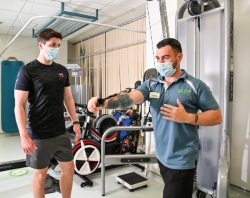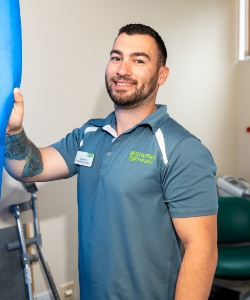How to condition your body for increasing sport and activity levels
What's the best approach? Personal Trainer and Physiotherapy Assistant Dave Bown shares his tips.
This means that a lot of you will be increasing your activity levels, which will be challenging for your body if you are not conditioned correctly. This can lead to a few different issues including overuse injury, fatigue and general stress to your body.
Below are some tips on how to prepare yourself for an increase in activity, and ensure your body recovers as quickly as possible, ready to go again!
Preparation

You should be preparing your body for whatever sport/activity you will be doing, and that means it has to be “specific”. This can be done in many different ways, depending on your sport, but can include sport specific drills, repeating key activities or movements and ultimately practicing your sport. This is to ensure your body is able to cope with the stress of playing your particular sport, and is done by gradually increasing the difficulty or intensity over a period of time to ensure you are ready.
Goals
We should all have targets. They encourage us to improve and keep us motivated and on track with our desired sport/activity. It doesn’t matter if you are competing or just going to the gym for general wellbeing, set yourself some short and long term goals. I would encourage people to ensure the goals are specific, achievable, and measurable.
Recovery
Recovery is something you may hear many professional sportsmen and women labelling as one of the most important parts of their training, and it’s something we need to factor in everyday (especially as we don’t have the luxury of being a full time athlete!). some examples of how we can optimise our recovery are:
Rest
Have a couple of planned days off through the week. This can have a massive impact on your mental health as well as your physical wellbeing. You do not have to sit on the sofa all day but take it easy and do something different and not so physically demanding.
Sleep
Guidelines suggest we should get at least 8 hours of undisturbed sleep per night for optimum recovery. Our muscles repair and grow during sleep, and when you are stressing your body, this is extremely important to keep on improving and feeling ready to hit another hard session.
Diet
What we put into our body has a huge effect on our performance and recovery. If you are training after a heavy night out, we will not perform adequately the following day. The same effect happens if we do not get enough carbohydrates (energy) at the right time, prior to activity. Speak to a nutritionist to get some specific advice about your dietary requirements based on your training load.
If we can follow some of these principles, there will always be room to improve in whatever you do. Good luck and go smash those goals!

More about Personal Trainer Dave Bown
Dave Bown is a physiotherapy assistant and personal trainer, based at our Physiotherapy Clinic at Nuffield Health Leeds Hospital, conveniently based in the city centre. With a solid record of impressive patient outcomes, Dave supports patients to help them reach their individual fitness and sporting goals. Read about Dave's recent patient: a semi-professional footballer.
To book a personal training session with Dave Bown, call: 0113 388 2064
More about personal training and the physiotherapy clinic at Nuffield Heath Leeds Hospital
